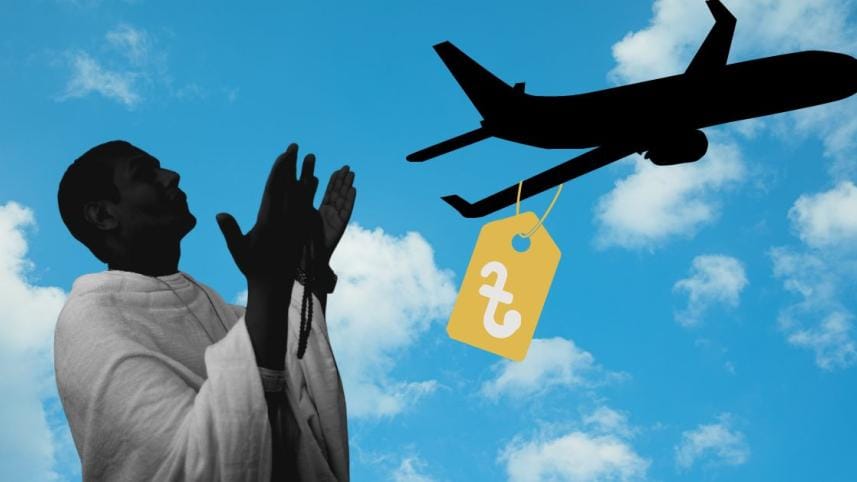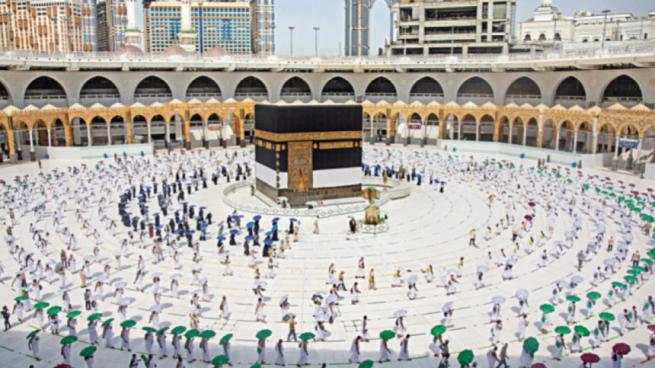Where are the hajj pilgrims?

Usually, only those who are financially capable can partake in the hajj pilgrimage. In a country like Bangladesh, apart from a few individuals, most have a limit to such capability.
Considering the reality, people save for a number of years – some throughout their whole lives – to be able to go for hajj. This year, there are 127,000 slots available for Bangladeshis to perform hajj. However, 86,128 devotees have completed the registration process till yesterday.
What's causing this slow enrolment into hajj packages this year?
The problem lies in this year's hajj package. Last year, the cheapest government hajj package was priced at Tk 4.62 lakh. This year, the same package costs Tk 6.83 lakh. Qurbani, food and other accompanying costs will increase the total expenditure to at least Tk 8-8.5 lakh.
How did the cost increase so much within a year?
The increased dollar rates certainly played a role behind such inflated costs, but the core reason lies in the commercial monopolisation of hajj flights by our national flag carrier.
As per the agreement between Bangladesh and Saudi Arabia, Biman Bangladesh Airlines carry half of the pilgrims for hajj, and the other half is flown by two Saudi carriers – Saudia and Flynas.
Biman, Saudia and Flynus have all raised their fares by 30 percent, which is double the usual price hike.
Usually, a round-trip air ticket for a Bangladesh-Saudi flight costs between Tk 80,000 and Tk 1 lakh. This year, Biman is charging Tk 2 lakh for the flight from the hajj pilgrims.
The reason Biman has presented for the doubling of airfare is quite strange. According to the Biman authorities, as the flights carrying hajj pilgrims to Saudi Arabia will come back empty, they will recover the loss incurred from empty flights through doubling the ticket price.
Instead of addressing the rampant corruption and irregularities surrounding aircraft leasing, repair, pilot appointment, airport management, etc, the air carrier has targeted the hajj pilgrims to recover its losses.
Perhaps the authorities assumed that no matter how much the hajj packages cost, the Muslim devotees in the country would take part in hajj. But due to limited spending capacity, even after the deadline was extended a few times, the registrations did not pick up. Biman clearly didn't consider people's limited purchasing capability.
Now the question arises: what could Biman have done differently?
One drawback of hajj flights is that they can only carry hajj pilgrims. The flights landing at the hajj terminal in Saudi Arabia have returned empty – they cannot carry general passengers back. Similarly, empty flights have to fly to Saudi Arabia to bring the pilgrims back after hajj. This is what Biman has considered to double the ticket prices, passing the burden on to the hajj pilgrims.
Last year, the cheapest government hajj package was priced at Tk 4.62 lakh. This year, the same package costs Tk 6.83 lakh. Qurbani, food and other accompanying costs will increase the total expenditure to at least Tk 8-8.5 lakh.
It must be noted that Saudia and Flynas are not allowed to carry general passengers on hajj flights either. Yet, due to poor monitoring at the Dhaka airport as well as the absence of a designated hajj terminal, these Saudi airlines carry general passengers on hajj flights.
Regarding carrying general passengers on hajj flights, Bangladesh has scopes for negotiation with Saudi Arabia.
Speaking to The Daily Star, aviation expert Wahidul Alam said, "If Biman adds a stopover in Dubai in hajj flights, this issue can be resolved as the empty flights can then carry general passengers to and from Dubai. It is a busy route during Eid, and as there are fewer Middle-East-bound flights compared to the demand, the fare increases naturally."
"If Biman flights make a stopover in Dubai or any other Middle East country, they can make hefty profits even without burdening the hajj pilgrims with doubled airfare," he added.
Can Biman get permission to do this?
"Biman can easily seize the opportunity," Wahidul Alam said. "Many slots are left empty in the Dubai flight schedule, which Biman can utilise. The deal between Bangladesh and UAE is that both countries are allowed to fly an equal number of flights every day. Only Emirates conducts three daily flights from Dhaka. Fly Dubai and Air Arabia conduct several daily flights, too. On the other hand, Biman and US Bangla only have two flights per day. Thus, there are many unutilised slots that Biman can easily use during hajj."
According to aviation experts, Biman took the easy way out for hajj flights. Arranging stopovers in Dubai will require efforts and negotiations; Biman avoided that and instead the airline authorities opted to pass the burden on to the hajj pilgrims.
If policies are unclear, if citizen welfare is not the focus of the policies, then decisions like this become easy to make and implement.
Biman is not solely to blame for this situation – the government has its fair share of liability. The policies that they are formulating are clearly not pro-people.
In conclusion, let me draw your attention to the hajj packages offered in India and Pakistan.
According to India's hajj committee website, since 2018, the hajj package in India costs 399,000 rupees. Also, as per a gazette from the minority affairs ministry, the government will pay a subsidy of 100,000 rupees per pilgrim this year, which means a pilgrim will ultimately have to pay less than 300,000 rupees. In Bangladeshi taka, that's less than Tk 4 lakh.
Pakistan's economy is almost on the brink of collapse. They are yet to officially announce their hajj package, but according to a report by Pakistan Today, the country's religious affairs ministry may set the package price at one million rupees, which is equivalent to around Tk 4 lakh.
According to ATAB, airfare for hajj flights is equivalent to Tk 1.2 lakh at best in both India and Pakistan.
It is actually about being considerate towards the people of the country. In Bangladesh, this trend is declining, especially in government and among policymakers. Even a symbolic gesture of empathy towards the general population is a far cry these days.
For this reason, a corruption-ridden organisation like Biman implemented a policy to put more pressure on the people, instead of trying to reduce the corruption level. And the government has aided them in this effort. In the end, it's the ordinary, pious people who are bearing the brunt.
Translated by Mohammed Ishtiaque Khan.
Golam Mortoza is the editor of The Daily Star Bangla.




 For all latest news, follow The Daily Star's Google News channel.
For all latest news, follow The Daily Star's Google News channel. 

Comments